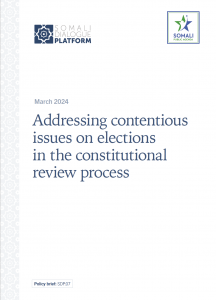Introduction
On 27 May 2023, Somalia’s National Consultative Council (NCC) agreed on elections at both a federal and state level.1 Unified local council elections were envisaged to start at district-level elections across all Federal Member States (FMSs) in June 2024, and state-level parliamentary and presidential elections in November 2024. Political parties, as per the agreement, would contest the June 2024 district elections, with the two parties gaining the most number of council seats then recognised as Somalia’s two national parties. Key components of the agreements were not, however, implemented, as doing so would necessitate significant changes in the current provisional federal constitution.
Against this background, this policy paper aims to contribute to a better informed, inclusive and realistic discussion of Somalia’s future elections. In providing an analysis of the provisional federal constitution’s revised Chapter 4, it offers insights that parliamentarians and other stakeholders can make use of in debates concerning the constitutional review process and the core components of the NCC election agreement. The paper explores possible options regarding the system of government, the electoral model, political parties and the election management body (EMB). Beyond this, it analyses the technical aspects and challenges of implementing the proposed electoral roadmap once it is agreed upon and voted for in parliament.
The paper is based on the revised version of Chapter 4 submitted by the OC and ICRIC to parliament on 12 February 20224. In addition, Somali Public Agenda (SPA) conducted a number of interviews with politicians and intellectuals in order to reflect their views on the proposed election arrangements.
This briefing is a product of the Somali Dialogue Platform in collaboration with the Somali Public Agenda. The Somali Dialogue Platform is a programme which supports Somalis to achieve consensus on contentious political issues and is implemented by the Rift Valley Institute. The Somali Dialogue Platform is funded by the UK Foreign, Commonwealth and Development Office (FCDO), the Ministry of Foreign Affairs of Denmark, and the United States Agency for International Development (USAID)



